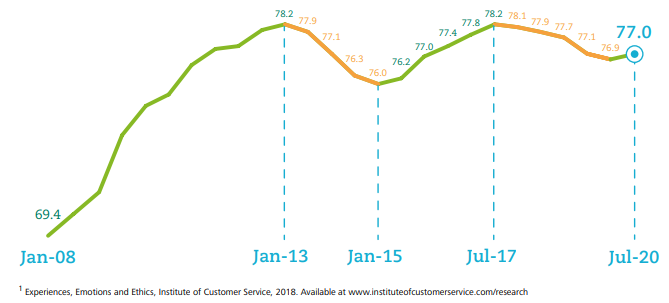By Jo Causon, CEO, The Institute of Customer Service
As lockdown restrictions continue to ease and more and more businesses open their doors, the lasting impact of the Covid-19 crisis on the customer experience environment is becoming clear. The results of our latest UK Customer Satisfaction Index (UKCSI), published this week, show satisfaction levels have flatlined over the past year. Yet despite the overall stagnation, we are starting to see a clear polarisation between organisations, as the winner and losers of the crisis emerge.
Encouragingly, the number of organisations that have seen customer satisfaction levels improve by at least two points has increased year on year. However, even more organisations have experienced a drop in satisfaction to the same degree. There is no doubt that some businesses have responded more effectively to the crisis than others. Those that have maintained a strategic focus on the customer, shown empathy and a focus on doing the right thing and maintained honest and consistent communications have been able to clearly differentiate themselves from their competitors. On the other hand, the impact of lockdown has starkly highlighted those organisations with weaknesses in their service offering, earning them the ire of frustrated and under-pressure customers that won’t be quickly forgotten.
As we move out of lockdown, it’s more crucial than ever to get our service offering right. The customer experience environment has changed, and we can expect it to become increasingly volatile, as cash-strapped customers become more discerning with where they spend their money. It’s no longer enough just to get the basics right. Customers are increasingly looking to brands to share their values and ethics – with factors such as support for vulnerable customers, doing the right thing by employees and championing sustainable business models playing an increasing role in which organisations customers choose to engage with. The key to long-term success lies in taking the time to understand who your customers are and what they need – and using this as a central pillar around which to operate.
The crisis has also shown the importance of remaining agile, so as to respond quickly and effectively to rapidly changing circumstances. Throughout the past few months, organisations have had to adapt the way they operate in order to cope with reduced team sizes, protect the health of safety of customers and employees, and respond to a sudden surge in demand from vulnerable customers. Those that have embedded service into their culture and values, and remained rigorously clear on their purpose, have seen themselves best placed to respond effectively to the changing needs of their customer base. As we enter an extremely difficult financial landscape – with industrial-scale lay-offs and a highly constricted job market – maintaining this focus will be paramount to success.
There is no doubt the next few years, and even decades, will be challenging – but we must learn from the mistakes of the past. After the last recession, we saw a collapse in customer satisfaction, with an increase of both complaints and the cost to serve customers. With high levels of customer satisfaction intrinsically liked to growth, profitability and productivity – it’s vital that we put service on top of the agenda in order to aid our economic recovery. We are at a vital juncture, and businesses must take the time to stop and reflect on what we have learnt over the past few months – and use it to better their service offering. In doing so, I believe we can unlock a step change in customer satisfaction, boost productivity and drive stronger financial results.



